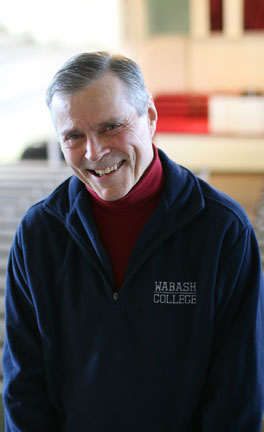
A published author honing his craft since his Wabash days, Dick Rose ’54 found his writer’s voice decades ago. But getting right the voices of the Chicago cops and street people who populate his latest novel,
The Lazarus Experiment, required research.
Rose has built a career as a financial expert with investment firms in Chicago, and his daily stock exchange and market reports on radio and TV made his a well-recognized name there. He knows parts of the city well.
But the guys he was writing about don’t spend much time with financial analysts.
“I needed help from a detective, and I didn’t know any,” Rose says. “One weekend I picked up the Sun-Times and the Sunday supplement featured John DeBartolo, who had been with Special Victims for more than 30 years and had cracked some major cases. So I called police headquarters, told John I was writing this novel, and asked if he’d be interested in being involved for 10 percent of the royalties on spec. He said, ‘Sure. Let’s get together.’
“He was from the old Italian side of the city, heavyset, well respected,” Rose recalls. “At our first meeting he says in this strong Chicago accent, ‘What we’re going to do is give you a feel for things—go out on some actual cases.’ I got into the Crown Vic with him, and we went into some pretty bad neighborhoods.
“What I gleaned from him was the way police act, the way they talk. They call the hot cases ‘heaters,’ the ones that make the papers; 99 percent of the cases don’t. When we had to drive someplace, he’d say, ‘Let’s slide over there.’ I met a lot of other cops in the precinct he’s buddies with, and we’d usually get together every two or three months for a beer or two.
“John read the book as I wrote it. We’d either get together or he’d send it back with notations on the pages. He changed some of the dialogue, and I’d ask him about police procedures—the way they track down information and the ways they get information out about a missing person.”
“John is quite a guy,” Rose says, adding that DeBartolo became the prototype for one of the minor characters in the book.
A major character in the book is modeled after another man Rose met during his research.
“In the book there’s a homeless guy helping the detective look for a missing man,” Rose says. “But I don’t know the first thing about being a vagrant.”
Enter Merv.
“Some homeless guys sell a publication called Streetwise to make money, and that’s what Merv was doing on this corner outside of a Starbucks,” Rose recalls. “I told him that I needed some help, and he said, ‘Sure,’ and I said, ‘I tell you what: Every time I write something about this character, I’ll meet you at Starbucks, give you 10 bucks, then you come back and tell me what’s wrong with it.’
“So each time I’d write some more of this character I’d look for Merv on the corner and we’d go through this process. He’d bring his girlfriend along and I’d buy her coffee, too.
“He gave me one description of a place I call The New Sphinx Hotel in the book. Merv said he’d freeze in a doorway rather than go in there. The hallways were littered, plaster was falling off the ceiling, and a room was just a mattress full of bedbugs on the floor with a light bulb dangling from the ceiling. They drank a cheap wine called Ricky’s, and prostitutes—they call them skeezers—would sneak in off the back fire escape. It’s a terrible place, but it’s one of the best chapters in the book.”
That bit of research ended up costing Rose more than just 10 bucks per meeting.
“One day I get this call from a public defender who says, ‘We’ve got Merv down here. He’s gotten in a fight with his girlfriend and she’s filed charges. He asked if you would post his bail.’
“I couldn’t go that night, so the next day this guy calls again. Merv was getting antsy, he said. They’d taken him from the fifth precinct to the Cook County lockup. This place is right out of a James Cagney movie—barbed wire fences, machine gun towers, people are camped all over to get in to post bond or see their loved ones. I go through two security points, all the benches are occupied. I finally find a seat. ‘How long you been here?’ I asked the guy next to me. ‘Four hours,’ he said. I got out my cell phone and told my wife that I was going to be later than I thought.
“In the end it all worked out. Merv showed up for trial a few weeks later so I got my $270 back. But I told Merv, ‘You’ve got to get a new girlfriend, ’cause I’m not doing this again.’”
 A published author honing his craft since his Wabash days, Dick Rose ’54 found his writer’s voice decades ago. But getting right the voices of the Chicago cops and street people who populate his latest novel, The Lazarus Experiment, required research.
A published author honing his craft since his Wabash days, Dick Rose ’54 found his writer’s voice decades ago. But getting right the voices of the Chicago cops and street people who populate his latest novel, The Lazarus Experiment, required research.